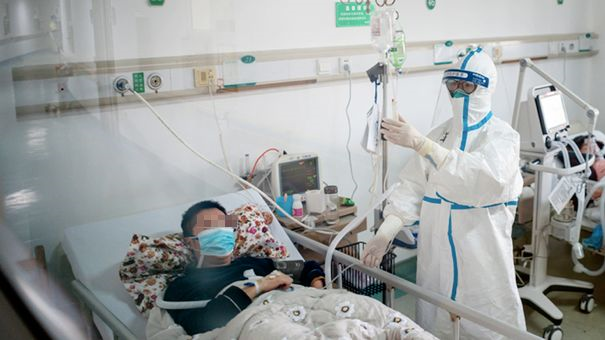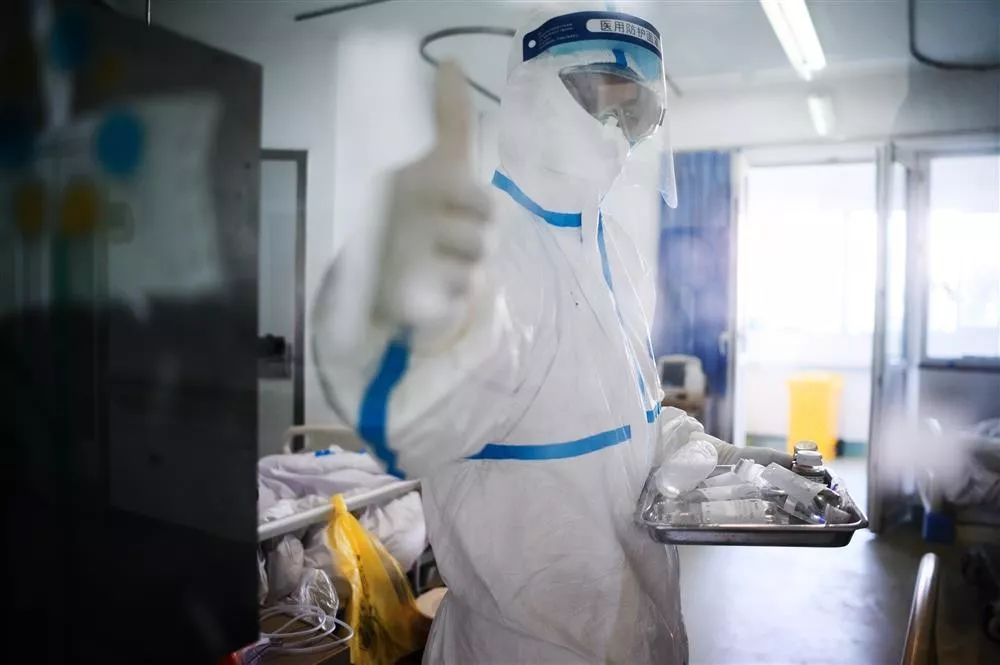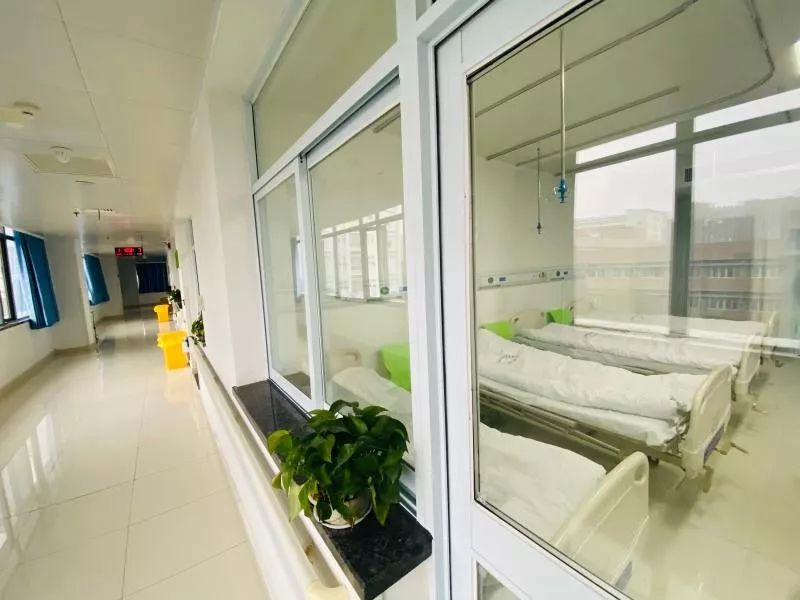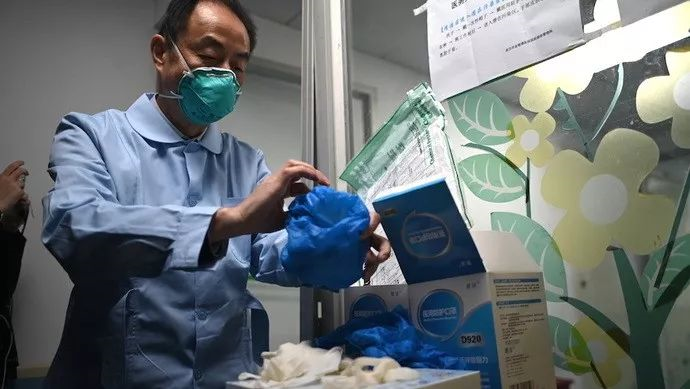- News
Interview with Zhou Xin: “The Difficulty of Treating Severe Cases of Novel Coronavirus Pneumonia is Greater Than That of SARS And Avian Influenza”
Zhou Jie, Xinmin Weekly
Many patients’ development of the diseases are unexpected. Although, the pressure is huge, Shanghai medical team will persist and try our best to lower the mortality.

On New Year’s Eve, Zhou Xin, 66-year old academic leader of the the department of respiratory and critical care medicine of Shanghai General Hospital voluntarily participated in the first batch of Shanghai Medical Aid Team, and acted as the expert group leader. In the previous fights against SARS and influenza A (H1N1), Professor Zhou Xin was neither absent. During the fight against H1N1, Professor Zhou Xin successfully led the team to achieve the first successful treatment of severe H1N1 patients in China, which has a huge influence in the country. Professor Zhou Xin is the key person of Shanghai medical aid team in Wuhan Jinyintan hospital. He is not only responsible for making treatment plans for patients, but also takes the lead in doing the most dangerous intubation for critical patients. As of February 14, 14 people in Wuhan Jinyintan hospital have recovered and discharged from the hospital, and some critical patients are getting better. With the implementation of the policy that all of the patients should be received and treated in hospital without exception, the number of critical patients in Wuhan Jinyintan hospital began to increase. On February 12, Xinmin weekly connected with Zhou Xin. He said that although there was a lot of pressure for treatment, Shanghai medical team would persist and strive to reduce the mortality.
The virus also invades other organs
The challenge of treating critical patients is not small
Xinmin Weekly: How about the critical patients managed by Shanghai medical team? Have you accumulated some experience in treatment?
Zhou Xin: At present, among the patients we treated, there have been 14 discharged cases, and many critical patients have been transferred to the general wards. The novel coronavirus pneumonia is a self limited disease, that is to say, when the disease develops to a certain extent, it can gradually recover. So if most of the light patients don’t get worse, and have been isolated and treated for two weeks, together with the nucleic acid tests negative twice in a row, he can be regarded as recovery. It's just like a cold. It depends on the patient’s own immune system. The patients with strong immune system can survive. We treat both the elderly and the young. It is said that the patients with basic are easy to be critically ill. Now it doesn’t seem like that. There are also many young people in their 30s and 40s in our wards with critical condition who do not have basic diseases. But once the elderly are in critical condition, the mortality will be higher, because pneumonia together with the original high blood pressure, diabetes and so on, is more difficult to treat. At present, we still don’t know the law of how the disease develops. Many patients’ disease development is beyond our expectation. It is more difficult to treat the patients with novel coronavirus pneumonia than those with SARS and avian influenza, because coronavirus attack other organs besides the lungs. For example, a patient look good and awake with oxygen saturation in good condition when we left hospital. The next day, we are told the patients suddenly passed away last night, because the virus not only invades the lungs, but also affects cardiac muscle. Generally speaking, the patient died of viral myocarditis. At present, we have not found an effective drug to treat critical patients. It is still not clear whether therapeutic drugs discussed on the internet have curative effect or not. Further clinical experiments are needed, including Remdesivir, which is of great concern. The drug is in clinical trial. The conclusion can only be reached after the experiment is over. There are antibodies against the coronavirus in the plasma of convalescent patients. It is an effective method in theory, but there is no large-scale clinical research on this method. At present, it is really difficult to rescue the critical patients. Our experience is that the overall mortality of critical patients treated with noninvasive or invasive ventilator is still relatively high.

At present, no secondary infection has been found in discharged patients
Xinmin Weekly: Do we have some understanding about the infectiousness of the novel coronavirus pneumonia?
Zhou Xin: we are still investigating the transmission of this infectious disease. We found that not everyone will get sick even if they are in close contact with the diagnosed patients. In addition, it is true that the number of children with this disease is relatively small. In the whole scale of confirmed patients, the number is not large, but the reasons are various, and it is unclear now. The morbidity of SARS, avian flu, or common influenza is similar to that of children and adults. It is not clear whether there is an antibody against the virus in children.
Xinmin Weekly: what is our standard for a discharged patient now? Will discharged patients have the risk of secondary infection?
Zhou Xin: at present, our discharge standard is the national standard. Firstly, the patient has no symptoms; Secondly, the pulmonary lesions are obviously absorbed in imaging; Thirdly, the nucleic acid tests are negative twice, and the interval between the two tests is one day. Patients who have been discharged from hospital will produce antibodies in their bodies. In general, this antibody will last for six or seven months in their bodies, that is to say, they will not have pneumonia caused by this virus for half year. At present, there are more than 500 discharged patients in Jinyintan hospital, none of whom have reinfected. We also found that it usually takes 2-3 weeks for patients’ nucleic acid test turning from positive to negative, so it is reasonable to observe 14 days for quarantine. The symptom appears within 14 days. If you don’t get sick, either you are not infected or recover from the diseases.

The protection of medical staff is most important
Xinmin Weekly: Has the pressure of medical staff been relieved after working in Wuhan for nearly 20 days?
Zhou Xin: After we came to Wuhan, we couldn't figure out what day it is today, because we work day and night. We came for the patients. Moreover, we are not the only medical team in Jinyintan hospital. We work with teams across the country. At the very beginning, we are not familiar with the working environment and workflow, so it takes a few days to get familiar with everything here. The ICU ward here is temporarily reconstructed from the general ward. The supplies are far from enough. Compared with doctors, nurses’ work are even harder. Since there is no worker in the ward, so the nurses not only have to give the patients injection and distribute medicine, but also to feed the patients, help them monitor the ventilator, handle the defecation, help them turn over and so on. Even the cleaning is done by nurses. And sick people are prone to be in a bad mood. Some patients take off their masks from time to time. Our nurses have to comfort them. On the other hand, we use the medical supplies economically. Our doctors try to avoid going to ward rounds together to reduce the use of protective clothing and masks. Each medical group arranges two doctors to enter the ward every day to check the patients. Roughly speaking, nurses work four hours a shift with six batches a day. It is certain that hundreds of protective clothing can be consumed a day. Warm-hearted citizens donated a lot of protective clothing and goggles, yet many of which doesn’t meet the medical standard.

Xinmin Weekly: Some news reports covers that the infection of medical staff in Wuhan is serious. What measures do we take to control hospital infection?
Zhou Xin: the medical staffs are infected in an early stage, because at that time, the study and judgment of the epidemic was limited from person to person, so doctors did not take proper protective measures during the consultation, which caused the infection. But now everyone has strong sense of protection and the protective supplies are sufficient. As a result, the hospital infection has been controlled. Shanghai medical team also attaches great importance to this issue. First of all, we need to protect ourselves before we can save others. If you can’t protect yourself, it will harm others, right? We’ve been here for 20 days and no one has been infected yet. In the early days, when I was on the night shift, I couldn’t turn on the air conditioner. It was very cold at work all night. Some of the team members caught a cold. They had a low fever and were very nervous. They used some medicine and did nucleic acid test and CT. It turned out that it was a false alarm. Later, the warm-hearted citizens donated down jackets, and the temperature also went up in these two days. We feel much better.

Xinmin Weekly: As an respiratory expert of first batch as well as the oldest member of the Shanghai medical team, what drives you to make the decision?
Zhou Xin: Shanghai medical team is the first medical team in China to arrive in Wuhan. I don’t have too much time to think about it before I made the decision. It’s an infectious disease of respiratory tract and I’m a doctor in respiratory department, so it is my responsibility to join this medical team. In addition, I’ve been involved in the prevention and treatment of pandemic diseases before. I went to Shanghai public health clinical center when SARS happened. I also participated in the prevention and treatment of avian influenza. So for me, I’m not afraid at all.
Xinmin Weekly: what is the state of patients in Wuhan now?
Zhou Xin: when we first came here, there were many patients in Wuhan. Now all kinds of management at all levels have gradually taken effect. Now they start to manage from the community and do a good job of isolation and protection. This measure is used to screen out all patients. In the speech given by General Secretary Xi Jinping, he stressed that every patient should be received and treated in hospital without an exception. Each hospital increased the scale of treatment. Jinyintan hospital has added 200 beds. Shanghai medical team is in charge of two wards. Originally, each ward had 30 beds. Now it has 41 beds with an increase of 22 beds. Many mobile cabin hospitals have been opened in Wuhan to treat light patients. As far as I know, now more than 17000 medical staff came to aid Wuhan. I believe that with the implementation of such measures, the data of new cases will gradually decrease.

Best wishes: the number of patients does not increase
Xinmin Weekly: Do you have any suggestions for the people who need to go back to work now? Is it safe to receive express delivery and take out?
Zhou Xin: the main thing is to wear a good mask and wash your hands frequently. It’s OK for ordinary people to wear ordinary masks. Alcohol disinfection is secondary. Now many people are worried about aerosol transmission. I don’t think we need to worry too much. Because of the large space, the viral load in aerosols is very low. You can take a shower when you come home from work. Now it is easy to do it. Express delivery and take out can be received by everyone normally, but you need to wash your hands after you take them, because you don’t know who has passed these things. Xinmin Weekly: what is your biggest wish currently?
Zhou Xin: We wish the fewer patients, the better. The number just doesn’t increase.
